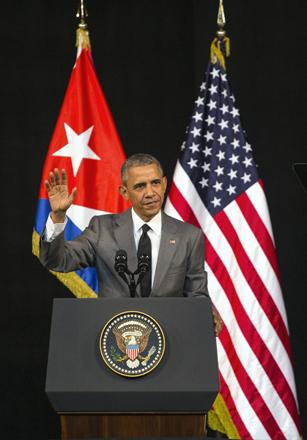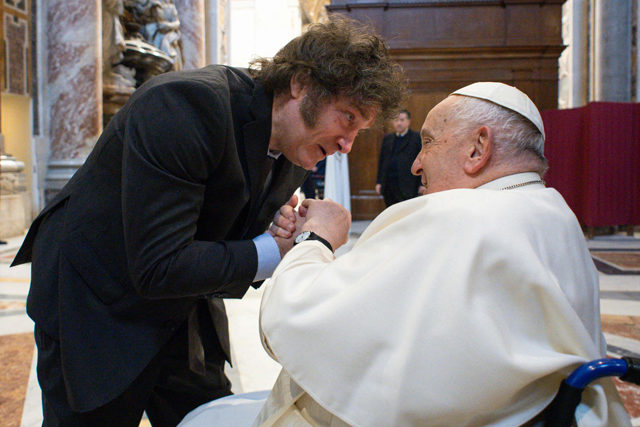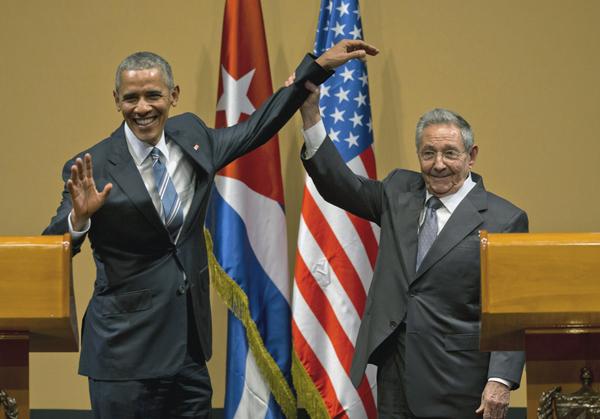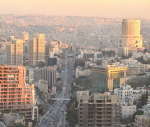You are here
Pope celebrates mass in east Cuba on anniversary of his calling
By Reuters - Sep 21,2015 - Last updated at Sep 21,2015
HOLGUIN, Cuba — On a special anniversary for him, Pope Francis celebrated mass in east Cuba on Monday on the last full day of a trip where he has been praised for aiding rapprochement between the communist government and the United States.
Two predecessors have visited Cuba, but Francis was the first Pope to visit Holguin, capital of the province where the Castro brothers and leaders of Cuba, Fidel and Raul, grew up. He said a mass for tens of thousands of people in sweltering heat.
September 21 was the day in 1953 when the Argentine Pope said he first felt a calling from God.
The then-17-year-old Jorge Mario Bergoglio was heading to meet friends for a picnic marking the start of spring in the southern hemisphere when he felt an urge to enter a church he was passing in Buenos Aires.
It was there that he felt a strange pull. "I can't say what it was but it changed my life," he told one biographer.
That took place on the feast of St Matthew and the Pope dedicated his Holguin homily to the Bible story of the conversion of the former tax collector who decided to follow Jesus Christ.
Holguin is a centre of Cuban music and the mass was accompanied by lively Caribbean sounds.
On nearly every block, posters welcoming the pontiff adorned doors and telephone poles, while bike-taxis and horse-drawn carriages traversed below the yellow-and-white flags of the Vatican, fluttering alongside Cuba's red, white, and blue.
The government of President Raul Castro, who attended the Holguin mass, had hoped the 78-year-old Francis would explicitly condemn the still-intact US economic embargo against Cuba before leaving on Tuesday for Washington.
He has not done so yet but on arrival on Saturday, he did urge the old cold war foes to deepen their detente after this year's restoration of relations, which the Vatican mediated.
Dissidents detained
Critics of the one-party state want papal support for dissidents, some of whom have been rounded up and denied attendance at papal events.
A Cuban human rights group said 50 to 60 government opponents had been arrested and several dozen more blocked in their homes by state security agents. The same happened when Pope John Paul visited in 1998 and Pope Benedict in 2012.
"We estimate about 100 people affected by this preventive repression," said Elizardo Sanchez, who runs the Cuban Commission of Human Rights and National Reconciliation.
During the first two days of his visit, Francis has stuck largely to spiritual messages in speeches, though he has also called for tolerance of different ideas.
"Believer or non-believer, we believe in the Pope!" said Yami Mendez, a retired schoolteacher in Holguin who is not a Catholic but, like most Cubans, holds Francis in high esteem.
Climbing the steep road to a hilltop cross, Mendez cited benefits associated with Francis: the US diplomatic breakthrough, the release of more than 3,500 common prisoners, and the fresh paint and renovations at the places he will visit.
In his first two days in Havana, the Pope met both Castro brothers. But there was no encounter for dissidents. Three were hauled away on Sunday before he said mass. Two prominent opponents, Miriam Leiva and Martha Beatriz Roque, said they were twice detained to stop them attending papal events.
The Castro brothers, both educated by Jesuits, repressed the Church after the 1959 revolution but relaxed restrictions from the 1990s and have now seen three pontiffs visit them in less than two decades.
Francis flies from Cuba to the United States on Tuesday.
Related Articles
HAVANA — US President Barack Obama delivered an impassioned appeal for political liberties in Cuba, including freedom of expression and reli
VATICAN CITY — Argentina’s top political and religious leaders — President Javier Milei and Pope Francis — met for the first time on Sunday
HAVANA — US President Barack Obama pushed Cuba to improve its record on human rights and sparred with President Raul Castro during a histori


















